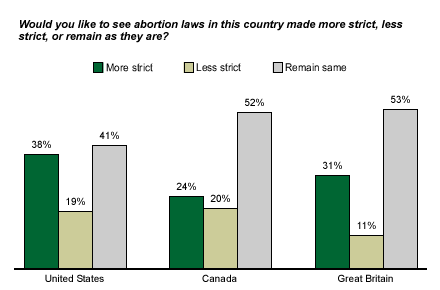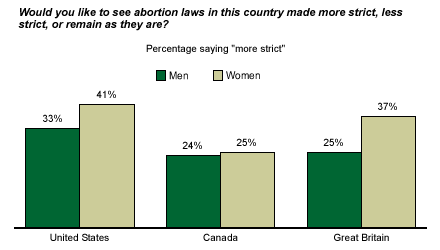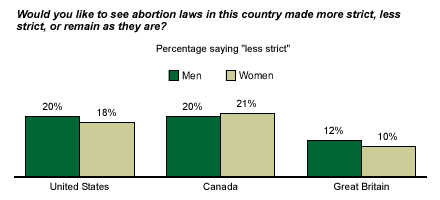Abortion is a contentious topic in general, but it seems to generate more heat in the United States than across the border in Canada or across the "pond" in Great Britain. While recent multinational Gallup polling* shows just 41% of Americans would like their country's abortion laws to remain as they are, slightly more than half of Canadians (52%) and Britons (53%) say the same.
The percentage of Canadians advocating for change in the abortion laws is about evenly split among those who favor stricter laws (24%) and those who want laws to be less strict (20%). Proponents of stricter laws far outnumber those favoring less strict laws in both the United States (38% vs. 19%) and Great Britain (31% vs. 11%).

Although abortion laws tend to vary from state to state and province to province, abortion is legal in the United States, Canada, and Great Britain. The laws in each country are so nuanced that it's difficult to say which of the three nations has the "strictest" laws overall.
Gender Gap
In the United States and Great Britain, women are somewhat more likely than men to favor stricter abortion laws, while in Canada, men and women seem to be of the same mind on the issue. Forty-one percent of American women vs. 33% of American men think laws should be stricter, as do 37% of British women vs. 25% of British men. By contrast, the percentages are about the same in Canada: 24% of men and 25% of women think their abortion laws should be stricter.

About equal percentages of men and women in all three countries would like to see their country's abortion laws made less strict. Among Americans, 20% of men and 18% of women favor more lenient laws; among Canadians the percentages are 20% of men vs. 21% of women, and among Britons the percentages are 12% of men vs. 10% of women.

Other Factors
Americans' views on abortion laws tend to vary more by certain demographic characteristics than Canadians, or Britons'.
For example, there appears to be a relationship between annual household income and opinions about abortion. About half of Americans making under $20,000 a year support stricter abortion laws. That percentage steadily declines as income rises; those making $75,000 a year or more are about half as likely to support stricter laws and twice as likely to think the laws should remain the same. In Canada and Great Britain on the other hand, support for stricter abortion laws is not as disparate across income levels.
One factor that may be influencing this distinction is the high religiosity of Americans. Church attendance in the United States tends to fall as income levels rise, it is very likely that religious involvement, rather than income per se, may have the strongest influence on attitudes about abortion. Nearly two-thirds of Americans who say they attend church weekly support stricter abortion laws.
*Results in the United States are based on telephone interviews with 1,005 national adults, aged 18 and older, conducted Jan. 3-5, 2005. For results based on the total sample of national adults, one can say with 95% confidence that the maximum margin of sampling error is ±3 percentage points. The survey was conducted by Gallup USA.
Results in Canada are based on telephone interviews with 1,006 national adults, aged 18 and older, conducted April 11-17, 2005. For results based on the total sample of national adults, one can say with 95% confidence that the maximum margin of sampling error is ±3 percentage points. The survey was conducted by Gallup Canada.
Results in Great Britain are based on telephone interviews with 1,012 national adults, aged 18 and older, conducted April 5-18, 2005. For results based on the total sample of national adults, one can say with 95% confidence that the maximum margin of sampling error is ±3 percentage points. The survey was conducted by Gallup UK.
In addition to sampling error, question wording and practical difficulties in conducting surveys can introduce error or bias into the findings of public opinion polls.
